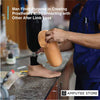Move Forward After Limb Loss With Amputee Life Coaching
Although conventional talk therapy has benefits, more people with limb loss discover life-changing benefits from life coaching. And today, there are life coaches specifically trained to help you live your best life post-limb loss.

Don’t get me wrong. Traditional therapy is still effective in helping you address various challenges, including anxiety, chronic pain, depression, and substance abuse. In a nutshell, therapy focuses on diagnosing what’s wrong with you and then fixing it.
In comparison, life coaching acknowledges that everyone’s broken on some level. From there, life coaches help you work with what you’ve got, guide you where you want to go, and, most importantly, teach you how to thrive.
Coaching is oriented toward problem-solving and goal-setting. It’s designed to help you achieve an objective, resolve a conflict, or make a targeted change. Like a sports coach, a life coach can help with accountability, focus, persistence, and motivation.
While the features of life coaching and talk therapy may overlap, the latter offers certain benefits to people with limb loss. If you’re a new amputee struggling with life post-surgery, you might want to explore this option.
Fortunately, there are already several trained amputee life coaches. We’ve listed a few of them below.
Adria Twyman
Adria Twyman is a triple amputee (both legs and left hand). She started coaching after struggling to move forward with limb loss. Also known as Robo Barbie, Twyman also works with the families and caregivers of amputees, providing counseling to encourage positive thinking and promote healthy adaption to limb loss.
Kelliana Cole
Kelliana Cole first became a life coach because she wanted to help women feel confident in their future. Cole offers a six-week group coaching course called Confidence Academy. Although the program isn’t explicitly designed for amputees, it covers issues that people with limb loss typically find challenging, such as body image, fear of failure, self-doubt, and dealing with society’s unrealistic standards. The ongoing Confidence Academy batch, via Zoom, started on July 7 and ends on August 18, 2022. You can also sign up for one-on-one life coaching.
Kevin Kappler
As a clinical psychologist, Kevin Kappler has spent years helping people cope with panic disorders and post-traumatic stress. When he lost his limb ten years ago, Kappler faced various challenges. Now he knows the psychological difficulties people face after losing a limb first-hand. Kappler also completed his post-doctoral work at the San Francisco VA Medical Center, treating veterans who returned with limb loss and trauma.
Kappler offers free initial consultations. If you decide to work with him, you can expect a flexible, individualized plan that fits your budget and mental health needs.
Lindsay Boudreau
Lindsay Boudreau is a trained clinical social worker. She became active as a peer visitor and support-group member after she lost her right leg below the knee in her late 20s. Boudreau’s coaching program features practical tools to help you make the mental and physical adjustments with limb loss while building a new action plan to get you moving forward again.
Tracy Metzger
Tracy Metzger is a military veteran of 25 years and has been living with limb loss for four years. She believes ignoring pain, especially emotional pain, doesn’t help anyone. But being vulnerable and embracing how you feel will help you feel more courageous and worthy. Metzger is gifted at promoting physical fitness among amputees who lack the motivation to begin or feel so out of shape that they don’t know where to start. If you’ve been meaning to jump-start your fitness regimen, Metzger might be able to help.
What about you? Do you prefer talk therapy or life coaching?










































































